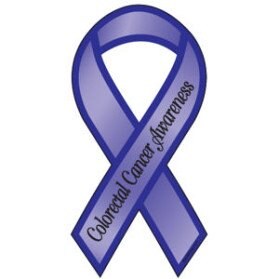March is National Colorectal Cancer Awareness Month
Source: The National Cancer Institute
What is Colorectal Cancer?
Colorectal cancer is cancer that starts in the colon or rectum. The colon and the rectum are parts of the large intestine, which is the lower part of the body’s digestive system. During digestion, food moves through the stomach and small intestine into the colon. The colon absorbs water and nutrients from the food and stores waste matter (stool). Stool moves from the colon into the rectum before it leaves the body. Those over the age of 50 are most susceptible to forming colorectal cancer.
Colorectal cancer often begins as a growth called a polyp, which may form on the inner wall of the colon or rectum. Some polyps become cancerous over time. Finding and removing polyps via colonoscopies can prevent colorectal cancer.

Why should I get a screening done?
Screening is looking for cancer before a person has any symptoms. This can help find cancer at an early stage. When abnormal tissue or cancer is found early, it may be easier to treat. By the time symptoms appear, cancer may have begun to spread.
It is important to remember that your doctor does not necessarily think you have cancer if he or she suggests a screening test. Screening tests are given when you have no cancer symptoms. Screening tests may be repeated on a regular basis.
If a screening test result is abnormal, you may need to have more tests done to find out if you have cancer. These are called diagnostic tests.
What are ways I can prevent colorectal cancer?

Different ways to prevent cancer:
- Getting regular colonoscopies every 5-10 years after the age of 50
- Changing lifestyle or eating habits
- Avoiding things known to cause cancer
- Taking medicines to treat a precancerous condition or to keep cancer from starting
More Information and Help
Johnston Medical Associates – Gastroenterology can provide screenings with a doctor’s referral. For more information, call 919-938-7182 or visit our website.